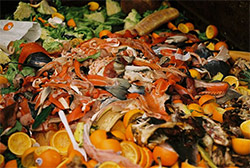 What do you do with your leftover food at the end of every day?
What do you do with your leftover food at the end of every day?
According to a report published today, supermarkets are opting to turn waste produce and surplus food into biogas rather than donating them to people in need.
Currently, the government offers millions of pounds worth of subsidies for those involved with the construction, maintenance and the day-to-day running of anaerobic digestion plants. These plants, it is stated, convert around 100,000 tonnes of food which is fit for human consumption into biogas, according to the charity FareShare.
Obviously, this means that retailers and suppliers can cut costs by shipping off their leftovers to energy schemes.
“We live in a country where people are hungry yet we are using taxpayers’ money to destroy edible food,” said Frank Field, the former Labour welfare minister on the issue.
Mr. Field has also led an inquiry into the food poverty and has labelled the system of subsidies relating to the disposal of food as “madness on stilts” and has called upon changes to be implemented which would see donating produce become the cheapest option available.
Within the inquiry it was found just 2% of the amount of surplus stock that was produced by the food industry as a whole found its way to charitable organisations. The remaining 98% either gets turned into biogas or gets dumped.
Mark Varney, the director of food for FareShare, commented that the subsidies meant that donating was not an economically viable proposition under the current scheme. FareShare, they state, have to charge a fee of £60 to £80 per tonne of contributed food in order to cover overheads such as storage and distribution costs. In comparison, biogas companies would be able to recoup £60 to £70 per tonne.
A government spokesman said in a statement that: “The government works closely with the food industry to encourage action to prevent waste – where appropriate surplus food should first be re-used for human consumption before it is considered for generating energy.”
